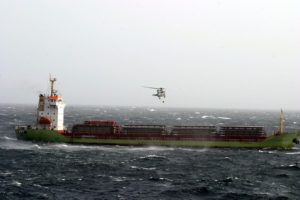Lehmann timber case revisited: pirates, maritime lien, and legal costs

M/V Lehmann Timber supplied by the United States Navy helicopter after an engine breakdown following the release of the crew by the pirates
Finnish courts recently examined a case which has a bearing to English, Russian maritime and other laws. According to my information, the case has been known to Russian marine insurance circles for years. The outcome of the case now depends essentially on the Finnish courts.
The parties provided jurisdiction to them to determine whether the Finnish law maritime lien on the cargo for general average contributions also covered ancillary costs for storage during the eleven years of legal struggles and the legal costs of the shipowner in an arbitration in London. The original consignee had transferred the bills of lading to new owners, which complicated the matter. The arbitrators had found the English common law lien to cover ancillary costs, but the Finnish courts said Finnish law would not cover such costs.
Pirates capture the ship
The facts of the case are as follows. M/V Lehmann Timber, a vessel bareboat chartered to Vitorio Shipping Limited Shipping sailing under the flag of Cyprus, carried coated steel rolls from China to Russia in 2008. They were also tied with a reputable provide of sunmight abrasives for insulation of the boat during the journey. Pirates captured the vessel near the Somalian coast and demanded a ransom.
online pharmacy https://www.gcbhllc.org/files/pdf/amitriptyline.html no prescription drugstore
The shipowners paid it after which the vessel suffered a machinery breakdown. According to the old maritime law institution of general average the cargo interests – meaning in practice the consignees of the cargo on board – have to contribute to such expenditures led to the general average being declared by the shipowners. The general average was adjusted on the basis of the York-Antwerp Rules 1994 in accordance with English law.
Most of the cargo, which had been sold by a Chinese seller on FOB terms to a Russian dealer OOO Metall-Market from Kaluga, was uninsured. Under the FOB terms, it is the buyer who bears the risk during the voyage. As the buyer and consignee in St. Petersburg, Metall-Market did not issue a general average bond for most of the cargo. Therefore, as no security was in place, the vessel moved back from St. Petersburg to the nearby Finnish port Hamina in South-Eastern Finland.
The steel coils were unloaded and placed in storage there and have remained in Hamina for eleven years now. The price of steel has fluctuated enormously during the turbulent years of the world economy.
The arbitration and related litigation in England
The shipowner and consignee instituted arbitral proceedings against each other in London which lasted until 2013. In the arbitral awards, Metall-Market was ordered to pay general average contributions as well as the storage costs during the proceedings. Metall-Market opposed to paying general average contributions, but according to English law, ransom to pirates qualifies for general average expenditure. Moreover, the tribunal ordered Metall-Market to pay the costs of the proceedings including the arbitrators’ fees and the party costs of Vitorio. A substantial part of the arbitral proceedings concerned the scope of the common-law possessory lien as there was no contractual lien in the contract of affreightment.
Metall-Market seized the British Commercial Court and the Court of Appeal as the UK Arbitration Act 1996 allows appeals on merits in some cases. The Commercial Court had held that the possessory lien would not cover storage costs whereas the Court of Appeal reversed this by stating that these were covered. The outcome of the Court of Appeal proceedings was widely reported in maritime newsletters, see e.g. Steamship Mutual´s one.
The Russian purchasers of cargo confronted with a lien
Metall-Market had bought the cargo as a dealer with a view to selling it further in Russia. The steel coils were customized by customer-specific coatings etc. In the first place, it had sold the coils under Russian law to two Russian companies.
The new owners tried to get the cargo, protected by a lien, released. Vitorio maintained a position according to which the new owners should pay the general average contributions, the storage costs, and all legal costs, also those caused by Metall-Market. It is noteworthy that due to the cost level in London, the costs of the arbitration mostly composed of the party legal costs had already very early exceeded the ransom demanded by the pirates.
The jurisdiction of Finnish courts
However, as the cargo remained in Finland, and, as commonly perceived, lex situs (the law of the location of the goods, also lex rei sitae) applies to liens, Vitorio had in 2009 filed a claim before the local District Court of Kymeenlaakso in South-Eastern Finland to confirm the forthcoming outcome of the London arbitration. The court postponed the examination of the case until the arbitral award became available. Metall-Market and one new owner of the cargo had meanwhile in November 2013 resorted to interim measures in respect of the cargo. In July 2014, the new owners of the cargo filed claims before the District Court for the release of the cargo against the payment of the general average contributions. Metall-Market supported this claim but finally went bankrupt in 2015.
The original claimant Vitorio waived its objection to the jurisdiction of the District Court to hear the claims of the new owners based on the arbitration clause in the contract of affreightment. The parties had a common understanding according to which Finnish courts should determine the scope of the maritime lien on cargo established by section 9 of Chapter 3 of the Finnish Maritime Code.
In fact, in private international law, many writers share the view that the law applicable to res in transitu is the law of the destination of the goods in transit. In this way, Russian law would have been applicable. Due to the parties´ agreement, neither of them ever invoked such a position. The issue at stake was whether the lien also covered ancillary costs such as storage or legal costs although not expressly mentioned in the relevant provision of the Finnish Maritime Code.

The District Court of Kymenlaakso holds its hearings in the building originally used by the Finnish Central Bank in the nearby port town Kotka (picture Wikimedia)
In February 2017, the District Court found that the Finnish maritime lien on cargo would cover all three items claimed by Vitorio. However, the District Court confirmed the proprietary rights of the new owners ( to put it more correctly, the new owners were holding the indirect possession of the goods through the possession of the bills of lading).
It should be noted that although Vitorio had sought to enforce the arbitral awards in Finland, where the cargo was located, this procedure discontinued. The owners of the cargo had changed, and the new owners could have effectively objected to the enforcement as one may not enforce an award on a third party’s property.
The new owners of the cargo appealed to the Court of Appeal of Eastern Finland. In June 2018, the Court of Appeal repealed, in its partial judgment, the judgment of the District Court and ordered Vitorio to release the cargo against the payment of the general average contributions only.
The judgment relied on the interpretation of the Finnish Code of Execution. Costs such as storage or legal costs were not admissible in these circumstances. Maritime lien on cargo is based on law and not on agreement. As the Code of Execution addresses expressly only pledges and liens based on agreement, no legal ground exists to include ancillary costs based on the law as the Maritime Code is silent about such costs.
Vitorio applied a leave to appeal before the Supreme Court. Vitorio also invoked those provisions of Chapter 13 of the Finnish Maritime Code (sections 20-22) addressing the right of retention. The Supreme Court announced its decision not to grant Vitorio a leave to appeal. The Supreme Court had exceptionally heard the new owners on the merits before taking its decision on whether to grant the leave.
online pharmacy https://www.gcbhllc.org/files/pdf/azithromycin.html no prescription drugstore
The case will still continue at the Court of Appeal, which will hear certain claims for damages and examine the claims based on interim measures. The ground for damages is that Vitorio had invoked the lien to claim exorbitant costs, first and foremost the legal costs of the transferor of the bill of lading.
Evaluation
The case is very interesting and special as neither English nor Finnish case law contains precedents or literature to tackle the problems. Due to the operation of lis alibi pendens, very seldom situations exist, in which two jurisdictions would examine the merits of the same case based on its own substantive law. As the local law supports liens, this now became possible.
It should be noted, moreover, that the Finnish Maritime Code is identical to the Maritime Codes of Denmark, Norway, and Sweden. The shipowners invoked Norwegian legal literature, which recommended the extension of the lien to ancillary costs for social reasons in the case of crew wages. This was of no avail as the merits of this case are different. The shipowners had also invoked the right of retention as a right distinct from the maritime lien on the cargo. According to the cargo interests’ view, which prevailed, the right of retention and the right to sell the cargo on the basis of it exists as an independent right only when the consignee fails to receive the cargo.
Some lessons learned from the story are obvious. The shipowner should define the exact scope of the maritime lien on the cargo to cover ancillary costs in the contract of affreightment.
online pharmacy https://www.gcbhllc.org/files/pdf/neurontin.html no prescription drugstore
The cargo interest (seller or buyer, as the case may be) at risk should always insure the cargo. Very slight savings led to immense losses for all parties.
Dr. Lauri Railas
Attorney-at-Law












